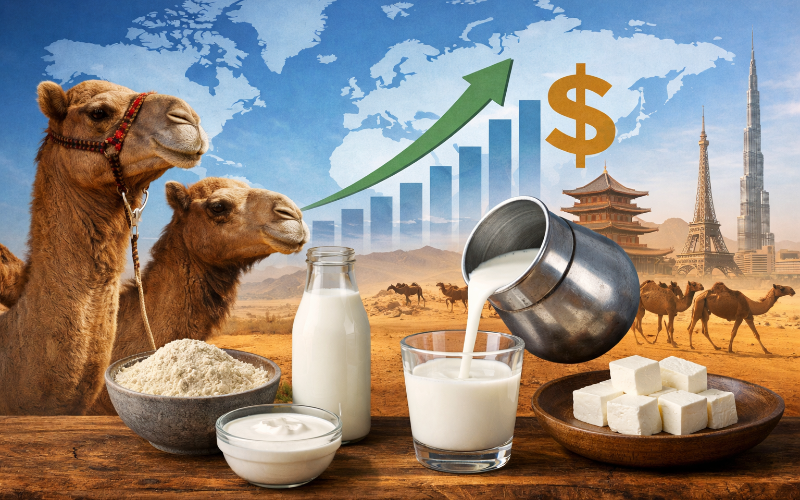Rabobank Warns of Inflation, Deficit, and Trade Turmoil Under Trump Policies
A report by Rabobank projects inflation, increased federal deficits, and disruption to agricultural trade if President-elect Donald Trump implements his proposed economic policies. The analysis highlights potential ripple effects from tariffs, tax cuts, deregulation, and increased defense spending, as well as their implications for farmers and the broader economy.

Economic Policies and Immediate Effects
Rabobank’s report, Trump 2.0: Impacts on Global Food and Agriculture, outlines key economic promises by the president-elect, including tariffs on major trading partners, tax reductions, and deregulation. According to Roland Fumasi, head of RaboResearch Food & Agribusiness – North America, these measures are likely to drive inflation and slow GDP growth, with significant consequences for agriculture.
“Tariffs are immediately inflationary,” Fumasi said, noting that they raise the cost of imports, including farm equipment and inputs. “Farmers will see higher production costs, squeezing margins at a time when the agricultural economy is already struggling.”
Economic Risks and Knock-On Effects
The report identifies several policy areas that could exacerbate economic challenges:
Tariffs and Inflation: Proposed tariffs on imports fr om China, Mexico, and Canada would raise consumer prices and increase input costs for farmers. Higher inflation could lead the Federal Reserve to maintain elevated interest rates, adding pressure to supply chains and borrowing costs.
Labor Shortages: Tighter border policies could shrink the labor pool, increasing wages and adding to inflationary pressures across sectors, including agriculture.
Strong U.S. Dollar: A stronger dollar, resulting fr om inflation and higher interest rates, would make U.S. exports more expensive for foreign buyers, reducing competitiveness in global markets.
GDP Slowdown: Simulations in the report suggest tariffs could erode purchasing power and provoke retaliatory measures, slowing real GDP growth.
Potential Upsides
The report acknowledges some benefits from Trump’s economic agenda:
Tax Cuts: Extending or enhancing Trump-era tax cuts could boost disposable income for individuals and businesses. For the agriculture sector, this could ease financial pressure, although the impact on federal revenues remains a concern.
Reduced Regulation: Simplified regulations might lower costs for businesses in the food and agriculture sectors, improving efficiency.
Lower Energy Prices: Efforts to expand domestic fossil fuel production could reduce energy costs, though Rabobank notes OPEC’s influence on global supply and demand may lim it this impact.
Cheaper Feed Costs: Depressed grain prices, partly influenced by policy shifts, could benefit livestock and dairy producers through lower feed expenses.
Uncertain Outcomes
The actual impact of Trump’s policies will depend on their implementation, Rabobank cautions. For instance, tariff-related financial aid, like the market facilitation payments provided during Trump’s first term, could mitigate some losses for farmers. However, these payments also increase the federal deficit.
The appointment of Robert F. Kennedy Jr. to a key regulatory position could introduce additional scrutiny into the food and agriculture supply chain, potentially offsetting gains from deregulation.
Trade flexibility remains another wildcard. While tariffs may disrupt existing export markets, Fumasi likens global trade to “musical chairs,” wh ere gaps left by U.S. exporters may open opportunities elsewhere.
Agriculture’s Critical Role
Despite the challenges, Trump’s policies often emphasize rural and agricultural America as vital to the nation’s economy. “President-elect Trump views food and agriculture as a backbone of the American economy,” Fumasi said, though he added that the overall economic impact will hinge on execution.
“Farmers and businesses should prepare for significant uncertainty in the coming years,” Fumasi advised. “Basic economic principles tend to prevail, and right now, they’re signaling turbulence ahead.”
Rabobank’s report, Trump 2.0: Impacts on Global Food and Agriculture, outlines key economic promises by the president-elect, including tariffs on major trading partners, tax reductions, and deregulation. According to Roland Fumasi, head of RaboResearch Food & Agribusiness – North America, these measures are likely to drive inflation and slow GDP growth, with significant consequences for agriculture.
“Tariffs are immediately inflationary,” Fumasi said, noting that they raise the cost of imports, including farm equipment and inputs. “Farmers will see higher production costs, squeezing margins at a time when the agricultural economy is already struggling.”
Economic Risks and Knock-On Effects
The report identifies several policy areas that could exacerbate economic challenges:
Tariffs and Inflation: Proposed tariffs on imports fr om China, Mexico, and Canada would raise consumer prices and increase input costs for farmers. Higher inflation could lead the Federal Reserve to maintain elevated interest rates, adding pressure to supply chains and borrowing costs.
Labor Shortages: Tighter border policies could shrink the labor pool, increasing wages and adding to inflationary pressures across sectors, including agriculture.
Strong U.S. Dollar: A stronger dollar, resulting fr om inflation and higher interest rates, would make U.S. exports more expensive for foreign buyers, reducing competitiveness in global markets.
GDP Slowdown: Simulations in the report suggest tariffs could erode purchasing power and provoke retaliatory measures, slowing real GDP growth.
Potential Upsides
The report acknowledges some benefits from Trump’s economic agenda:
Tax Cuts: Extending or enhancing Trump-era tax cuts could boost disposable income for individuals and businesses. For the agriculture sector, this could ease financial pressure, although the impact on federal revenues remains a concern.
Reduced Regulation: Simplified regulations might lower costs for businesses in the food and agriculture sectors, improving efficiency.
Lower Energy Prices: Efforts to expand domestic fossil fuel production could reduce energy costs, though Rabobank notes OPEC’s influence on global supply and demand may lim it this impact.
Cheaper Feed Costs: Depressed grain prices, partly influenced by policy shifts, could benefit livestock and dairy producers through lower feed expenses.
Uncertain Outcomes
The actual impact of Trump’s policies will depend on their implementation, Rabobank cautions. For instance, tariff-related financial aid, like the market facilitation payments provided during Trump’s first term, could mitigate some losses for farmers. However, these payments also increase the federal deficit.
The appointment of Robert F. Kennedy Jr. to a key regulatory position could introduce additional scrutiny into the food and agriculture supply chain, potentially offsetting gains from deregulation.
Trade flexibility remains another wildcard. While tariffs may disrupt existing export markets, Fumasi likens global trade to “musical chairs,” wh ere gaps left by U.S. exporters may open opportunities elsewhere.
Agriculture’s Critical Role
Despite the challenges, Trump’s policies often emphasize rural and agricultural America as vital to the nation’s economy. “President-elect Trump views food and agriculture as a backbone of the American economy,” Fumasi said, though he added that the overall economic impact will hinge on execution.
“Farmers and businesses should prepare for significant uncertainty in the coming years,” Fumasi advised. “Basic economic principles tend to prevail, and right now, they’re signaling turbulence ahead.”
Key News of the Week









